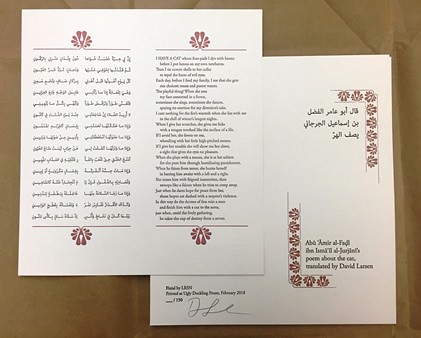Concerning mice and cats, Abu 'l-Shamaqmaq said (meter: khafīf):
On the emptiness of my home, and empty
sacks and jars where meal should be, this is my poem.
Formerly, it was not desolate but guest-friendly,
prosperous, and in a flourishing state.
Now it seems that mice avoid my house
to refuge in a nobler steading.
The flies of my house and the crawling bugs
all beg to hit the road, away from where
the cat abides, and looks from side to side,
and no mouse does it spy the whole year through.
Its head swims up and down from extremity of hunger,
and a life of bitterness and vexation.
I said to the cat, when I saw its head hanging,
downcast with its gut aflame,
"Hang in there, kitty! best cat by far
my eyes have ever seen!"
"How can I hang on?" said the cat. "I cannot stay
in a house that's empty as a wild ass's belly."
I said, "Go on to the neighbor’s house,
the one who brings home the fruits of commerce."
Meanwhile, spiders fill my pots and pans
and all my vessels with their spinning,
and off with the dogs, in the grip of dog-fever,
my dog runs mad astray.
From the Book of Animals of al-Jahiz






